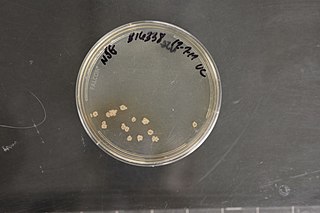Related Research Articles
Singulisphaera is a moderately acidophilic and mesophilic genus of bacteria from the family of Planctomycetaceae.
Yaniella is a genus of bacteria from the family Micrococcaceae. Yaniella is named after the Chinese microbiologist Sun-Chu Yan.
Yaniella flava is a Gram-negative, aerobic, non-spore-forming and non-motile bacterium from the genus Yaniella which has been isolated from saline soil from the Qinghai Province in China.
Thermanaerovibrio is a Gram-negative, non-spore-forming chemoorganotrophic and thermophilic genus of bacteria from the family of Synergistaceae.
Citricoccus is a gram-positive and non-motile genus of bacteria from the family Micrococcaceae.
Terrimonas is a Gram-negative, aerobic and non-motile genus of bacteria from the family of Chitinophagaceae.

Stackebrandtia is a Gram-positive, aerobic and non-motile genus of bacteria from the family of Glycomycetaceae. Stackebrandtia is named after the German microbiologist Erko Stackebrandt.
Planomicrobium chinense is a Gram-positive, aerobic and motile bacterium from the genus of Planomicrobium which has been isolated from sediments from the coast of the Eastern China Sea in China.
Planomicrobium flavidum is a bacterium from the genus of Planomicrobium which has been isolated from a marine solar saltern.
Mycetocola is a Gram-positive non-spore-forming and non-motile genus from the family of Microbacteriaceae.
Gaetbulibacter is a Gram-negative genus of bacteria from the family of Flavobacteriaceae.
Gillisia is a Gram-negative and strictly aerobic genus of bacteria from the family of Flavobacteriaceae. Gillisia is named after the Belgian bacteriologist Monique Gillis.
Gramella is a genus of bacteria from the family of Flavobacteriaceae. Gramella is named after the Danish pharmacologist Hans Christian Gram.
Kordia is a Gram-negative, strictly aerobic and non-motile genus of bacteria from the family of Flavobacteriaceae.
Mesonia is a strictly aerobic and chemoorganotrophic genus of bacteria from the family of Flavobacteriaceae.
Robiginitalea is a genus of bacteria from the family of Flavobacteriaceae.
Halobacteroides is a Gram-negative strictly anaerobic, chemoorganotrophic genus of bacteria from the family of Halobacteroidaceae.
Halanaerobium kushneri is a strictly anaerobic and halophilic bacterium from the genus of Halanaerobium.
Marinilactibacillus is a genus of bacteria from the family of Carnobacteriaceae.
Trichococcus is a mesophilic and psychrotolerant genus of bacteria from the family of Carnobacteriaceae. Trichococcus bacteria have the ability to utilize sugars, sugar alcohols and polysaccharides. Some species of Trichococcus species where transferred from the genera Lactosphaera and Ruminococcus.
References
- 1 2 "Planomicrobium". LPSN .
- 1 2 3 "Planomicrobium alkanoclasticum". www.uniprot.org.
- ↑ Parker, Charles Thomas; Garrity, George M (1 August 2008). Parker, Charles Thomas; Garrity, George M (eds.). "Taxonomic Abstract for the species". doi:10.1601/tx.9275.
{{cite journal}}: Cite journal requires|journal=(help) - ↑ Vos, Paul; Garrity, George; Jones, Dorothy; Krieg, Noel R.; Ludwig, Wolfgang; Rainey, Fred A.; Schleifer, Karl-Heinz; Whitman, William B. (2011). Bergey's Manual of Systematic Bacteriology: Volume 3: The Firmicutes. Springer Science & Business Media. ISBN 9780387684895.
- ↑ Schippers, Axel; Glombitza, Franz; Sand, Wolfgang (2014). Geobiotechnology II: Energy Resources, Subsurface Technologies, Organic Pollutants and Mining Legal Principles. Springer. ISBN 9783662444740.